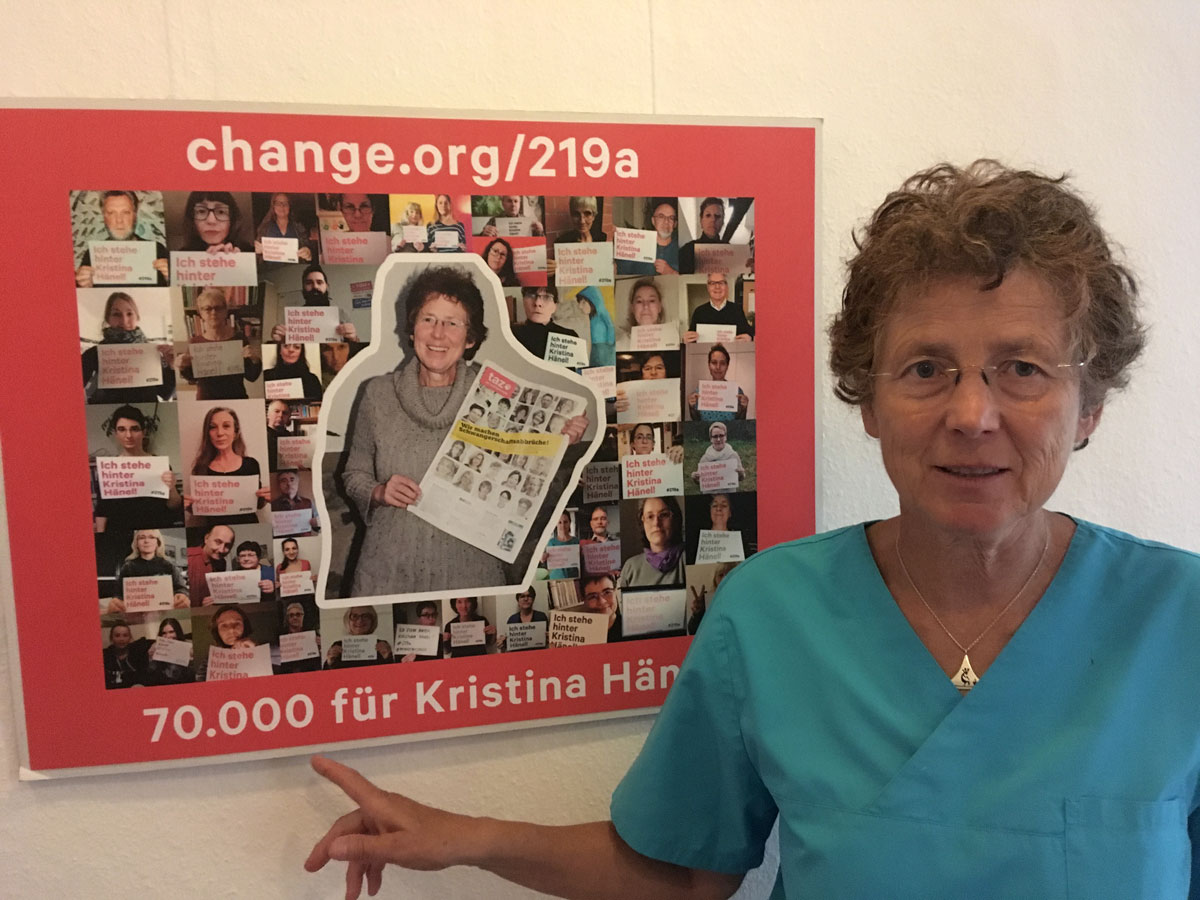
The story of Kristina Hänel’s battle against a Nazi-era abortion law begins in Giessen, a bustling university town in west-central Germany, some 70 kilometres north of Frankfurt. In November 2017, a local court slapped the 60-year-old gynecologist with a 6,000 euro fine for “promoting” abortions on her website, a criminal offence under section 219a of Germany’s penal code.
Six months after the court ruling, Hänel, who has refused to pay the fine and is appealing the decision, is still flummoxed. “There was no promotion!” she fumes. “How can a practitioner be found guilty of providing information on a medical protocol? This is 2018 and people go to the Internet for everything. It is not OK that women can’t have access to really important information there.”
The case has triggered a nationwide debate in a country that is generally seen as liberal-minded, with many Germans only beginning to realise how restrictive their abortion laws are as a result of Hänel’s protest. Referred to as a crime under article 218 of Germany’s penal code, abortion is technically forbidden in any instance. However, it is not punished if it is carried out within the first 12 weeks of pregnancy, provided the woman has received counselling first and has waited three days to reflect. It is also decriminalised in cases of rape or a threat to the woman’s life.
Do you even know who the father is? French girls will sleep with anyone"
A social security worker
“Having an abortion in Germany is a real obstacle course,” says Claire Alice, a 26-year-old French student based in Berlin, who went through the procedure last year. When Alice discovered she was pregnant while on the pill and getting regular periods, she quickly chose to terminate the pregnancy. She did not expect to come under pressure from ProFamilia, a state-funded, privately-run counselling service. “They tried to make me change my mind,” she says. “They said I would have no financial problems as my partner worked for Total. I just pretended I didn’t understand so as not to play along.”
In order to be reimbursed for the procedure, which cost 400 euros, “the equivalent of [her] monthly grant”, Alice needed a German social security worker to sign a certificate from her gynecologist. “I got all sorts of inappropriate comments: ‘I refuse to do this!’, ‘Do you even know who the father is? French girls will sleep with anyone’,” she recalls. The young woman tried eight different branches before a staff member finally agreed to sign the paper. “She told me she wished she had been given the choice in her youth,” the student adds.
When she arrived at the abortion clinic, she was surprised to find no signs on the entrance. “The doctor told me it was for reasons of discretion,” she says. “That’s when I realised just how backward Germany is on this issue.”
Society’s biggest taboo"
— Kristina Hänel
According to Hänel, abortion is German society’s “biggest taboo”. In Catholic and staunchly conservative Bavaria, for instance, it is very difficult to find the addresses of places that provide abortions. “In part, this is because there are very few public hospitals that offer the procedure,” she says. “But mostly it’s because ‘pro-life’ medical staff refuse to do it.”
Many gynecologists refuse to take part in abortions, citing a conscientious objection to the procedure. “It’s an argument anti-abortion activists are increasingly using across Europe, spurred on by the Catholic Church,” Hänel explains. “It’s a real problem in Italy and doctors in Ireland invoked it as soon as the referendum was over.”

Paul Cullen, the director of Doctors for Life, a non-profit group that describes itself as “medical and non-religious” and aims to “defend the right to life”, dismisses the notion that women who wish to terminate a pregnancy face obstacles in Germany. “Women who want to have an abortion can find all the necessary information at ProFamilia centres or in hospitals,” he says. “And all the doctors who provide abortions are listed by region.”
Nonetheless, some German women travel to Austria for an abortion, a service for which they are charged 800 euros in cash. “If they don’t have the cash, they are told to go fetch it at the bank… It’s a disgrace!” says Hänel.
The gynecologist says the media spotlight on her legal case has at least reopened the debate on the country’s antiquated abortion laws. For pro-choice Germans it was also a wake-up call, raising awareness of just how mobilised their opponents are, particularly online. Anti-abortion activists “are free to spread false information and call doctors murderers with total impunity”, Hänel laments, pointing to a website that likens abortions to the Holocaust. “This has to stop!” she protests.
It’s not only on the Internet that the pro-life camp has become increasingly visible. Since the far-right Alternative for Germany (AfD) party entered parliament last year, anti-abortion activists have also stepped up their street campaigns. In Frankfurt, the 40 Days for Life advocacy group organises prayer vigils outside ProFamilia offices during religious holidays, mirroring similar initiatives in Croatia.
The pro-choice camp, meanwhile, is lagging behind. “Germany is 20 years behind its European neighbours,” says Hänel. She laments the fact that abortion is not studied at medical schools and that very little research is dedicated to the subject, “whereas there are many publications by foreign students”.
Heartened by the support she received from colleagues and patients, Hänel has decided to take the fight to the federal level and push for abrogation of paragraph 219a of the penal code, under which doctors who publicly advertise abortions face a fine and a two-year jail term. The law is “obsolete and a threat to individual liberties”, she says, noting that it was introduced by the Nazis back in 1933.
Hänel sees French legislation, which recently cracked down on online obstruction to abortion, as an example to follow. Last year French lawmakers passed a new law that extends existing punishments – up to two years in prison and a 30,000 euro fine – to anti-abortion websites that “mislead” women by posing as neutral sources of information.

I will go as far as it takes"
— Kristina Hänel
To raise awareness, the gynecologist began a petition calling for paragraph 219a to be scrapped. In just a few months it garnered 150,000 signatures and won the support of the centre-left Social Democrats (SPD), the Greens and the far left. The proposal is up for discussion later this year in the German Bundestag, where it is likely to face resistance from conservative forces in Chancellor Angela Merkel’s CDU party and its CSU allies.
Meanwhile, Hänel says she is ready to carry her fight all the way to the European Court of Human Rights, spurred on by the messages of support she regularly receives.
“I got a letter from a woman in her seventies, who remembers the days of illegal abortions. She told me not to give in, and to keep fighting so we don’t go through that nightmare again,” she says, adding: “I will go as far as it takes.”



